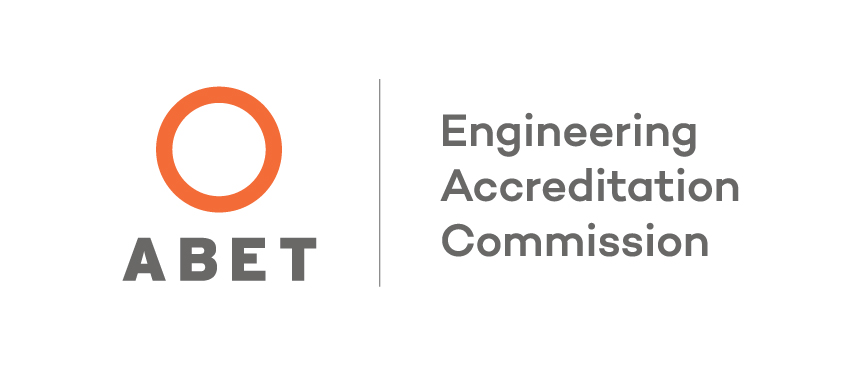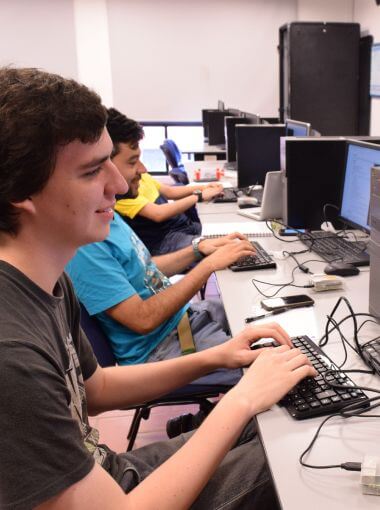Juan Carlos Cuellar
9 semesters and 1 internship semester
$ 11.570.000 COP
As a result of rapid advances of information and communication technologies the world has been a witness to a surge of a new society of information which requires the ability to create, process, distribute and store information securely anywhere.
An Icesi telecommunications engineer employs an analytical engineering approach to integrate software, hardware, and network communication systems to develop information and communication technology related projects. These projects help develop an interconnected world via a global internet network: advances toward smart cities, the internet of things (IoT) and cloud computing.
Icesi University is committed to providing engineers with the ability to create projects for organizations; These abilities include the development of creative problem solving with the use of their knowledge of lifecycle management (analysis, design, implementation, and deployment through to operations) for network infrastructure and IT services. An Icesi telecommunications engineer develops professional, administrative, and human competencies that allow them to become key players in all types of enterprises: social organizations, governmental agencies, and economic development through entrepreneurships.
The program seeks to form experts in the adoption of new technologies and in the development of engineering projects within the area of information and communication technologies. Three training paths that are strengthened and addressed throughout the course are:


The Telecommunications Engineering program is accredited by the Engineering Accreditation Commission of ABET, https://www.abet.org. The most important accrediting commission of engineering programs in the world. This was the result of a rigorous process of preparation and evaluation of our academic quality. This accreditation must be periodically renewed and was granted under the category of Telecommunications Engineering (Ingeniero Telemático) Globally, as of September 2018, there are only 35 engineering programs accredited by ABET in the category of telecommunications engineering. Icesi is the only one in Colombia and one of the 3 that exist in Latin America.
This accreditation confirms the quality of the Icesi University Engineering programs. It certifies that the program has implemented an effective and sustainable process to measure and improve quality. The accreditation confirms that the university has top-tier professors in their academic departments, that students are trained in all fundamentals of mathematics and science, in advanced engineering topics and in soft skills such as communication skills, both oral and in writing and in teamwork. In addition, it verifies that educational best practices in engineering are followed and that its curriculum includes aspects that exist in the industry.
Why is this accreditation important for telecommunications engineers?
 Since 2002, the Program has been accredited by the National Accreditation Council - Consejo Nacional de Acreditación (CAN) of the Colombian Department of Education. This accreditation is obtained via a voluntary process that includes verification and review by academic peers. It indicates that a university program meets the quality standards established by the Colombian Department of Education. In February 2017, the Telecommunications Engineering (Ingeniero Telemático) program received its most recent reaccreditation for a term of 8 years.
Since 2002, the Program has been accredited by the National Accreditation Council - Consejo Nacional de Acreditación (CAN) of the Colombian Department of Education. This accreditation is obtained via a voluntary process that includes verification and review by academic peers. It indicates that a university program meets the quality standards established by the Colombian Department of Education. In February 2017, the Telecommunications Engineering (Ingeniero Telemático) program received its most recent reaccreditation for a term of 8 years.
Institutional Accreditation
In December 2021, the Colombian Department of Education renewed this accreditation for a term of 8 years. The renewal of the High-Quality Institutional Accreditation Acreditación de Alta Calidad is a recognition of Icesi's permanent commitment to the region and to the country for maintaining its high quality standards in the development of training, research and social functions.


Program Educational Objectives (PEOs) describe what program graduates are expected to achieve within a few years of graduation. These objectives are defined by considering the needs of the program's constituents (or stakeholders), particularly the industry and our graduates. The PEOs of the Telecommunications Engineering program are consistent with the mission of Icesi, and they are periodically reviewed following a clearly defined process, which in turn is part of the program's quality assurance process.
The PEOs of the Telecommunications Engineering program at Icesi are as follows:
Within five years of graduation, graduates of the program will be able to:
For our graduates to achieve these educational objectives after graduation the program is committed to a process of continuous improvement to ensure that our students develop the following learning outcomes that are stated below:
Fields within telecommunications engineering include, among others:


Educational training in Telecommunications Engineering exploits a key trait in applicants: passion for technology. A potential applicant should want to create a positive impact on people's lives through the adoption of new communications technologies, new ways of being interconnected, and new technology-based services and applications.
Moreover, an applicant is expected to be committed to innovation, research, and self-learning.

Telecommunications Engineer graduates from Icesi are key facilitators in the adoption of new technologies.
Our engineers follow three lines of professional training:Furthermore, as a graduate of Icesi, Telecommunications Engineers are critical thinkers and autonomous learners. They can integrate and lead work teams. They also communicate ideas effectively and participate in the execution and monitoring of information and communication technology projects.

Here you will find information on the total number of students enrolled each semester in the Telecommunications Engineering (Ingeniero Telemático) program, as well as the number of graduates during the last five years.